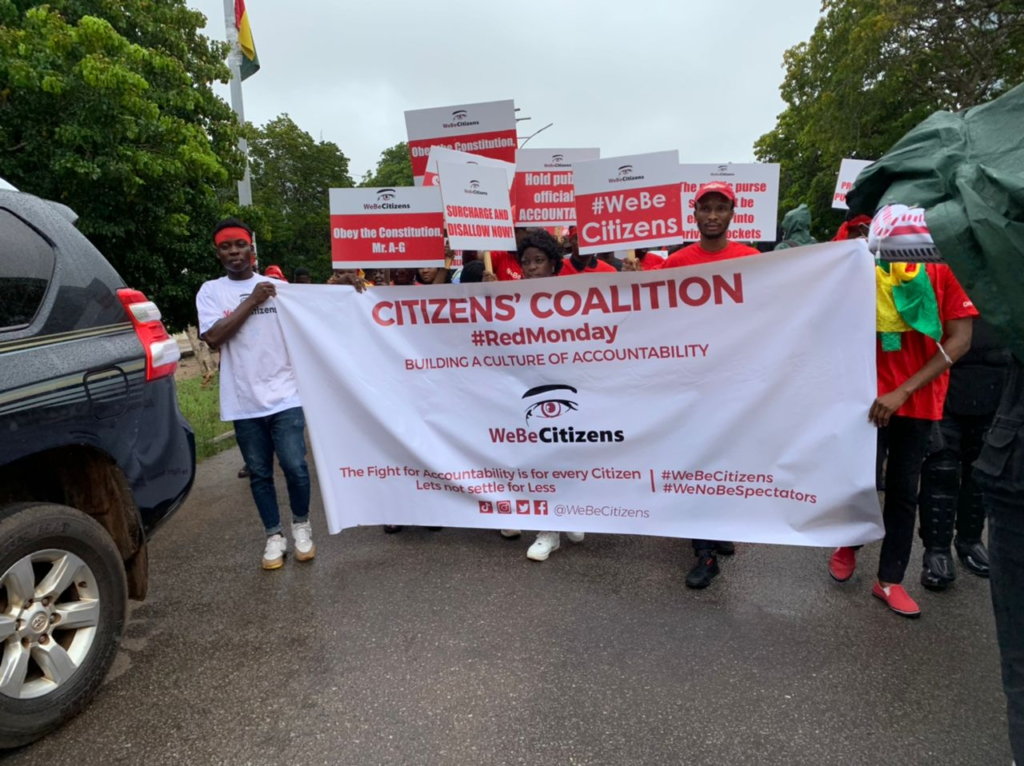Coalition for Democratic Accountability and Inclusive Governance led protestors in demanding better protection of the public purse. The group, which is made up of notable members of civil society, media, and the legal fraternity, is thus mounting pressure on the Auditor General to apply his surcharge powers to retrieve over GHS17 billion lost to financial irregularities in the 2021 financial year. The group members gathered at the Efua Sutherland Children’s Park in Accra to begin the protest to demand the enforcement of the powers.
Political corruption in Ghana has been common since the country attained independence. There is a growing perception in Ghana that government-related corruption is on the rise. Ghana ranked 73rd on the Corruption Perceptions Index in 2021, tied with Hungary, Kuwait, Senegal, and the Solomon Islands. Though corruption in Ghana is relatively low when compared to other countries in Africa, businesses frequently quote corruption as an obstacle to doing business in the country. Corruption occurs often in locally funded contracts; companies are subject to bribes when operating in rural areas where there is little or no supervision.
Bribery, theft, and embezzlement in the Ghanaian public space often arose from reversion to a traditional winner-takes-all attitude in our political system in which power and family relationships prevail over the rule of law.
There continue to be allegations of corruption in the tender process and the government has in the past set aside international tender awards in the name of national interest. It was alleged that even Meridian Port Services were not part of the tender for the port expansion (Terminal 3) but a call came from above that the contract should be given to them. Sadly, the Government of Ghana is to ensure that government officials do not use their positions to enrich themselves and engage in such acts themselves. Government employees have been known to ask for a “dash” (tip) in return for assisting with license and permit applications that do not require any fee.
Member of Parliament for the Chiana-Paga constituency, Abuga Pele was convicted in February 2018 and charged with a six-year jail term for willfully causing a loss of GH¢4.1 million to the state of Ghana. In June 2009, Mubarak Muntaka also resigned from his position as Minister of Youth and Sports on the orders of president Mills following investigations into dozens of allegations levelled against him including financial malpractice and abuse of power. The same thing happened during the first term of president Akufo-Addo in the same ministry.
In 2017, the then deputy minister of health, Kingsley Aboagye Gyedu asserted that Ghana’s health sector had high corruption rates because of its low level of accountability. For example, doctors at the Tamale Teaching hospital plant agents to direct patients from the hospital to their clinics and direct patients to procure drugs and lab tests outside the hospital thus reducing hospital revenue. The list is endless and popular among them are the Woyome story, the SNNIT software scandal, BOST, PDS scandal, Airbus Scandal, Agyapa deal, PPA boss selling government contracts, GRA boss scandal, etc.
A recent corruption Afrobarometer study conducted showed that the presidency and the parliamentarians are the second and third most corrupt institutions in the country. These institutions are to ensure the protection of the public pursues but the data and most corruption cases that hit the country show that they are rather doing the opposite. In 2021 alone many lost to irregularities is more than four times more than the money expected to be generated from the infamous Electronic Levy.
The protest by the WebeCitizens movement is a very great step toward Ghanaians showing their agitation towards the mismanagement of the public purse. Every citizen in the country must ensure that accountability is taken seriously. We must ensure that every Cedi we take from the public purse is used for our development rather than for enriching ourselves. The money lost to bribery and corruption in Ghana is more than the loan we are seeking from IMF and this GHS 17 billion lost to irregularities is a typical example. Strict laws must be enacted to ensure that corrupt officials are prosecuted for embezzlement.
Our constitution must be changed to ensure that there are “Checks and Balances” rather than “the winner take all” systems we practice. For Ghana to move forward, every citizen must not be a “Spectator” and one way we can ensure that is to demand accountability from our politicians and leaders.


In a country where accountability is very low, crime and corruption is very rampant.
Citizens must demand accountability from politicians and all persons holding public offices. this is because it is the citizens that have entrusted everything into their hands. When there is little or no accountability it is the public purse that suffers.